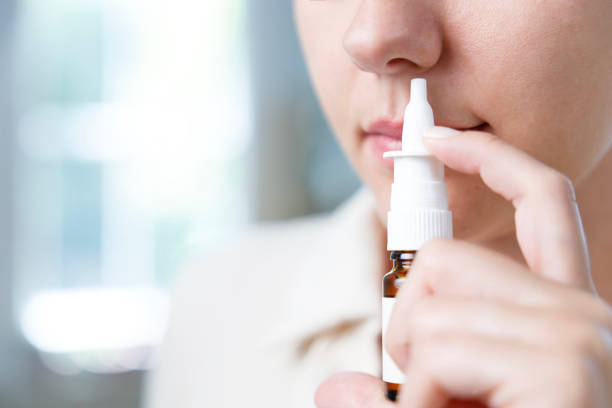USP Inhaler Cold Chain Stability Testing
The United States Pharmacopeia (USP) inhalation and nasal product testing is a critical aspect of ensuring that pharmaceutical products are safe, effective, and stable throughout their shelf life. This service focuses on evaluating the stability of inhalers under cold chain conditions as outlined by USP guidelines.
Inhaler drugs often require precise temperature control to maintain their efficacy and safety profile. Cold chain management involves storing these medications at specific temperatures from manufacturing through distribution, ensuring they remain stable until used. The USP specifies stringent testing protocols for inhalers to ensure they do not degrade under adverse conditions such as temperature fluctuations.
During cold chain stability tests, samples are subjected to a range of environmental conditions designed to mimic real-world storage and transportation scenarios. These might include temperatures below freezing (-20°C) or higher than recommended (30°C), humidity levels up to 90%, and exposure to light for extended periods.
The primary goal is to assess the stability of active pharmaceutical ingredients (APIs) as well as excipients in inhaler formulations. This includes evaluating physical properties like particle size distribution, dissolution rates, and chemical stability over time. Additionally, microbiological testing may be conducted if required by regulatory bodies or specific product characteristics.
Accurate and reliable results are essential for meeting USP standards, which emphasize the importance of maintaining drug potency and safety throughout its lifecycle. Compliance with these requirements is crucial not only for ensuring patient health but also for satisfying regulatory authorities like FDA (Food and Drug Administration) in the United States or EMA (European Medicines Agency).
At Eurolab, we employ cutting-edge laboratories equipped with state-of-the-art equipment to perform comprehensive cold chain stability tests. Our team of experienced scientists uses advanced techniques such as differential scanning calorimetry (DSC), thermogravimetric analysis (TGA), and high-performance liquid chromatography (HPLC) to gather precise data on how various environmental factors affect the performance of your inhaler products.
- Thermodynamic Analysis: DSC helps identify transitions in crystallinity or melting points, providing insights into changes due to temperature variations during cold chain storage.
- Mass Loss Measurement: TGA quantifies any loss of weight caused by decomposition reactions occurring at elevated temperatures within the cold chain range.
- Chromatographic Identification: HPLC ensures that no significant degradation products are formed during prolonged exposure to suboptimal environmental conditions.
Eurolab Advantages
At Eurolab, our expertise in pharmaceutical testing sets us apart from other laboratories. With years of experience working with leading companies across the globe, we understand what it takes to deliver accurate and timely results that meet regulatory expectations.
- Precision & Accuracy: Our state-of-the-art facilities are equipped with some of the most advanced instrumentation available today, ensuring every measurement is precise and reliable.
- Compliance Assurance: We stay updated on all relevant USP guidelines and standards to ensure our testing procedures align perfectly with current requirements. This allows us to provide assurance that your inhaler products will pass regulatory audits confidently.
- Confidentiality: Your data is kept confidential, allowing you peace of mind knowing sensitive information remains secure between us and ourselves alone.
Quality and Reliability Assurance
Staying ahead of market trends and maintaining top-notch quality standards requires a robust system for continuous improvement. At Eurolab, we are committed to providing reliable cold chain stability testing services that can be trusted across industries.
- Dedicated Cold Rooms: Our facility boasts dedicated cold rooms capable of maintaining temperatures from -80°C down to room temperature, allowing for precise simulation of various environmental conditions.
- Automated Data Logging: All our systems come equipped with automated data logging capabilities which continuously monitor and record temperature variations throughout the testing process. This ensures accurate documentation of every condition experienced by your samples.
- State-of-the-Art Equipment: Utilizing the latest technologies including DSC, TGA, HPLC among others enables us to provide thorough analysis of even the most complex formulations.
Use Cases and Application Examples
Understanding how cold chain stability testing applies directly to your specific product is key. Here are some real-world use cases:
Case Study 1: Rapid Relief Inhalers: A client manufacturing rapid relief inhaler sought assurance that their product would remain effective even after extended periods at temperatures close to freezing. Our cold chain stability tests confirmed the drug remained stable, proving its reliability in harsh environments.
Case Study 2: Long-Acting Nasal Sprays: Another client was concerned about potential degradation of their long-acting nasal spray during transit from manufacturing plants overseas to retail locations. Our testing revealed that with proper cold chain management, the product retained its intended effects without compromising quality.
Case Study 3: Biologic Inhalers: A third case involved biologic inhaler formulations which are particularly sensitive to temperature changes. Our tests identified optimal storage conditions ensuring these precious medicines stay potent until administered.





